Maritime Welfare in Croatia: Drvenik Case and What Law Says
June 25, 2021 - The issue of maritime welfare in Croatia was raised once again after a heated discussion on a beach in Drvenik Veli. Here are the details of the case and legal guidance to the maritime welfare in Croatia.
With the 2021 tourist season already being 58% better than 2020, tourists once again visit Croatia as one of the top holiday destinations.
However, like any year, the season can't go without at least some sort of incident.
Lovely beach, disgusting words
Yesterday, Croatia was shocked and enraged with the incident that happened on a beach on Drvenik Veli island (not so far from Trogir). Croatian journalist Tonka Alujević and her friend went to a beach where two Czech tourists started complaining that it's a private beach, perks of paying for a villa, and that Alujević needs to leave. Alujević refused to leave, stating that beaches are maritime welfare and cannot be privatized, refusing to move. After, as Alujević claims Czech tourists hit her head with a phone, they called the villa owner. 24 Sata daily newspaper published a video Alujević's friend recorded.
„Ma'ams, Ma'ams, how did you get here? On foot?“, asked the owner on a phone that was on speaker and held by the Czech tourists.
„I'm a journalist. Do you know Croatian laws? Do you want to end up in media?“ replied Alujević with a chill face while smoking a cigarette on a sunny day at the beach.
„Come on, put me in the media, come on put me! But first, go to the land register and see that my beach is private," screamed the owner in Croatian, with a lot of derogatory phrases (if only Czech tourists had a translator to understand the rich swear word heritage of Croatian language, right?)
The whole thing ended up with inspection stepping on the scene. Despite the video footage being clear, the owner, identified by Index.hr as Tomislav Meštrović, owner of Centovi Dvori Villa, tried to justify himself, saying everyone is welcomed at the beach, and he attacked the women because they passed through his doorway.
„No, I have no idea what video, who what... who knows what that is... I called the police for trespassing through my land“, said Meštrović to Index.hr when asked about the footage.
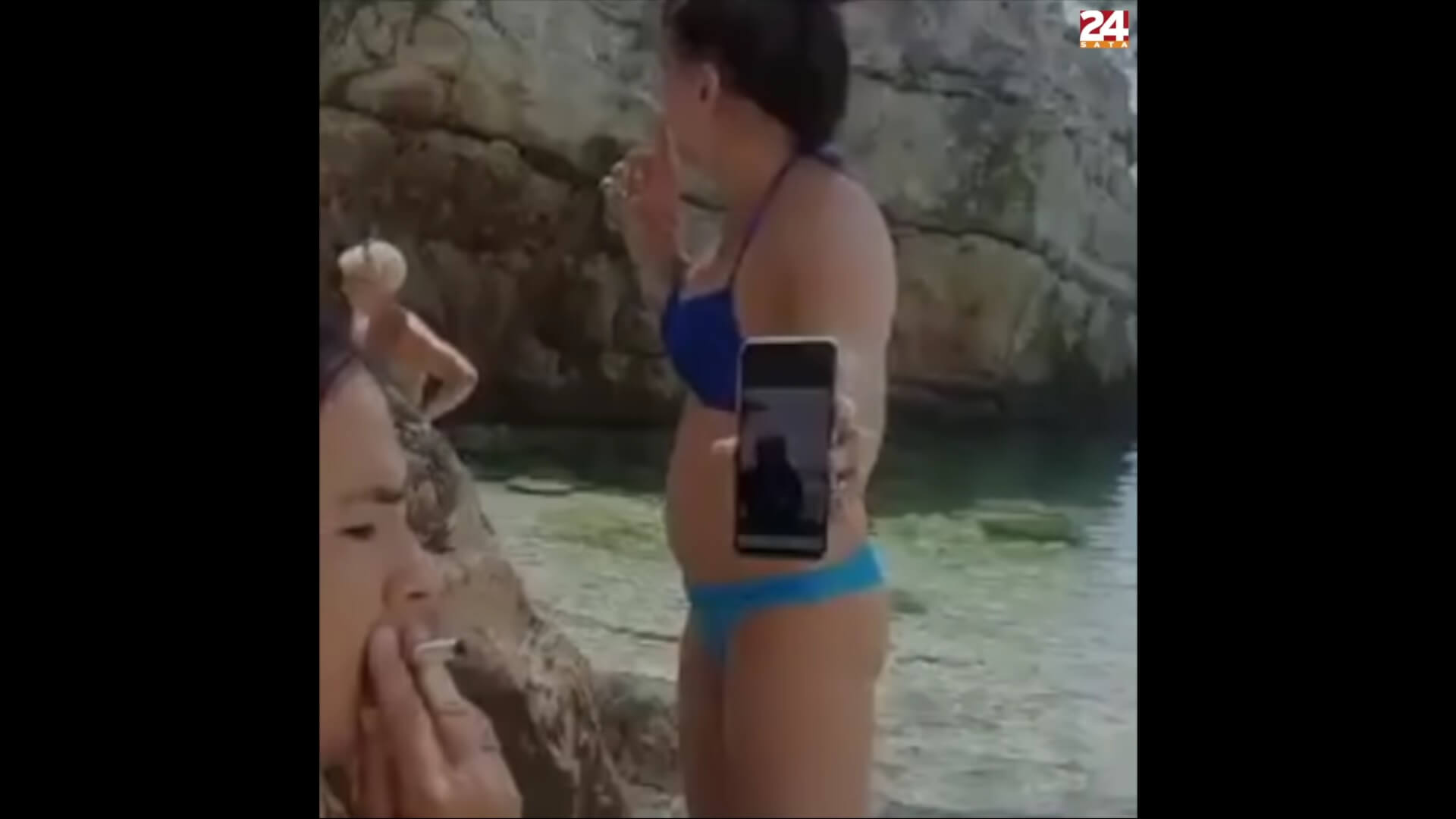
the conversation at the beach, screenshot/ 24sata
Law and order
Following this story, Index.hr's columnist Goran Vojković analyzed the law to clear up the issue of maritime welfare.
„The Maritime Welfare and Sea Ports Law states 'at least six meters from a line horizontally distant from the line middle waters'. But it can be wider, for example, if part of the land that in its nature or use serves to exploit the sea. It can also be narrowed- for instance, if support walls or a public road are close to the sea“, Vojković listed general rules but adding that maritime welfare border is specifically determined.
„So, the coast is free to use where the beach is, in general, six meters. You can come and use it for your needs, such as bathing, tanning, or walking. The land behind can be private, but the coast cannot“, concluded Vojković.
On the other hand, there are ways to limit the use of maritime welfare.
„There are some parts of the coast where you cannot enter. You can enter the marina and walk around it, but only until 10 pm. You cannot enter at all in a shipyard port. Those are the parts of maritime welfare for which the state assigned a concession to someone. The concession can limit or terminate public use“, explained Vojković.
Additionally, the law states that it is possible to have a beach in its concession and limit public entrance. But it needs to be registered, and the prices are so expensive that there are very few beaches like this in Croatia (Drvenik one not included in that small list).
„If someone claims that has a concession and that he/she can exclusively use some part of the coast, he needs to have a proof you can easily check in the register. I repeat, there are very small examples; even beaches in front of five-star hotels are public good“, Vojković pointed out.
And such beaches are filled with deck chairs, food stands, etc. But as Vojković pointed out, on a public beach, you have the right to bring your own deck chair, your own food, and drinks, and you can't be forced to consume content on the beach.
„In short, enjoy the Adriatic coast- with some very small exceptions of exclusive concessions, the entire coastline (including island coast) is free for your use and joy. Nobody can hold a grudge or complain if you came to a bath where they think it's 'their' beach. If someone is uncomfortable, don't debate, call authorities“, advises Vojković.

Pixabay
And the beach is open for public happily ever after
As Jutarnji List reported, the Drvenik case has a conclusion to an intriguing plot. Unhappy with Meštrović's behavior, Dalmatian locals went vigilantly and started writing bad reviews on Google, seeing the villa losing its value and tourists.
„Even though neither the building, nor its surroundings changed since the video was released, the unkindness of the owner was enough to move once-prestigious villa to the lowest grading Croatian places on Google“, says Jutarnji.
A couple of more lessons can be learned for a successful and enjoyable season from this tale.
For owners: present your offer fair in accordance with the law as transparency is the best way for your offer to beat the competition.
For tourists: if you were promised a private beach, but you see locals coming, don't be rude to them and don't attack them. The only one you can really be mad at is your host, who perhaps lied about what they can truly provide.
Learn more about beaches in Croatia on our TC page.
For more about travel in Croatia, follow TCN's dedicated page.
Zagreb Local Elections 2021 Analysis: No "Ideological Referendums", Strictly Freedom And Solutions Wanted
May 30, 2021 - Following the turbulent public debate of the Zagreb mayor candidates that ended with Tomislav Tomašević winning the capital of Croatia, TCN reporter Ivor Kruljac brings you the Zagreb Local Elections 2021 Analysis, concluding that Zagreb is a city open for all ideologies but in constant search of quality solutions.
It's official – Tomislav Tomašević (seen on the lead image) is the new mayor of Zagreb, the 54th in a row when you look through Zagreb's history.
As a brand new chapter in Zagreb's local politics is turned, many are still uncertain about whether the former mayor Milan Bandić would lose or win another mandate if he hadn't suddenly and prematurely passed away earlier this year. Still, as Jelena Pavičić Vukićević, Bandić's successor joined the mayoral race and came in third place (despite being perceived as the keeper of Bandić's tradition), we could argue that is the indication that Bandić being suspected of corruption (and taken to court on several occasions) could've been the political end for him, had he lived to see the fight. But, of course, given Bandić's strong personality, that indication needs to be taken with a grain of salt, as many believe that not only would Bandić get to the second round of elections - but he'd even win them.
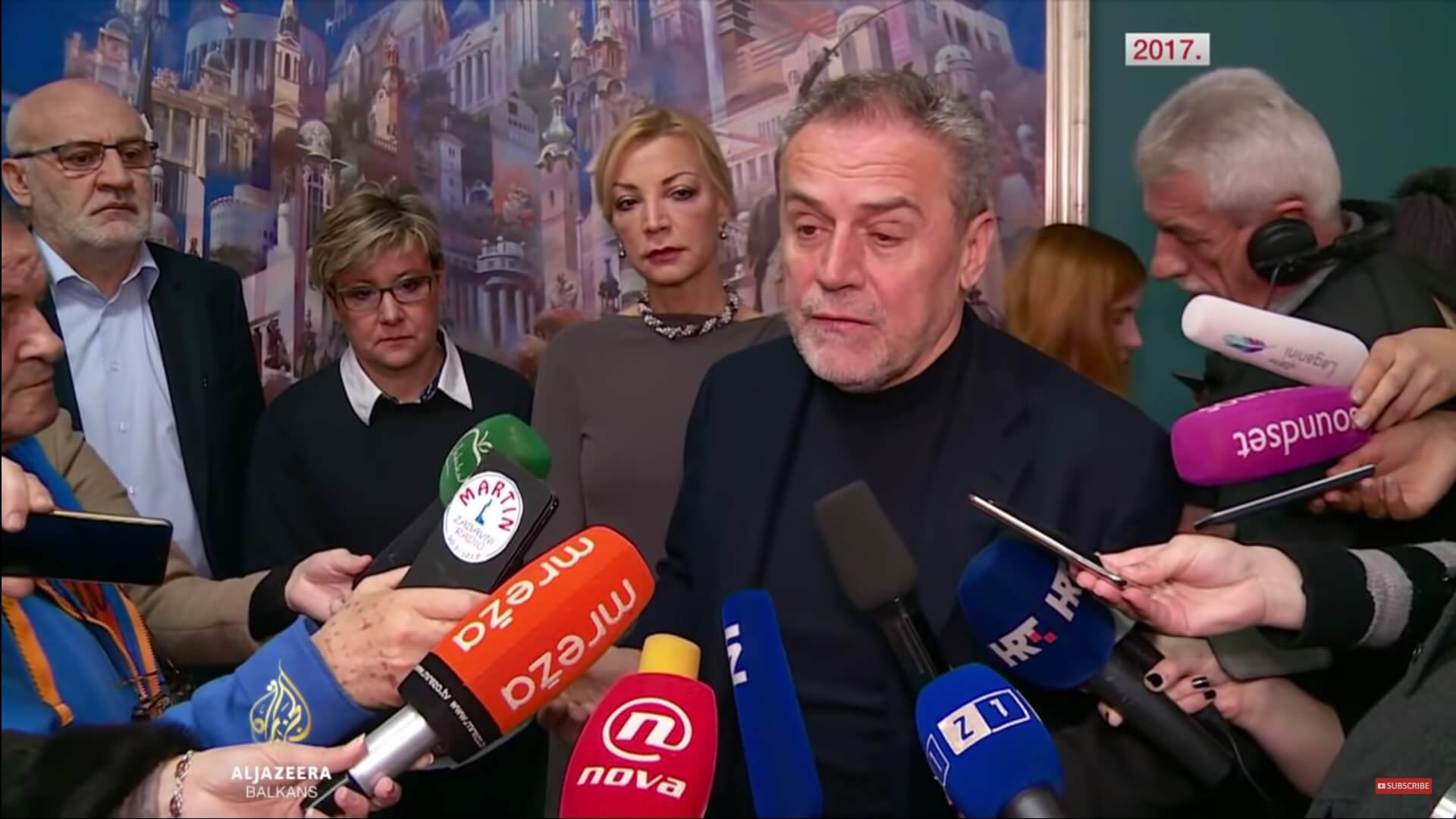
Former Zagreb mayor Milan Bandić, screenshot / Al Jazeera Balkans
A quick recap
In the first round, Tomislav Tomašević from the green-left platform We Can! (Mozemo!) earned a stunning 45,15 percent (147,631) votes. Not only was that twice as more than Škoro and Pavičić Vukičević combined, as N1 reported, but it was also more than with what Milan Bandić won in the second round of local elections back in 2017.
The mayoral race in Zagreb was highlighted with the question of who will succeed Milan Bandić and who will properly address all the debts and unfairly earned employment in the city administration as well as the overpricing of numerous city projects (such as the many fountains and the plagued Sljeme cable car). Additionally, there were the issues of the handling the mess of the Jakuševec junkyard, as well as handling the post-earthquake reconstruction of Zagreb's very heart. The only thing the majority of the candidates agreed to be good were the city's social policies, but they can still be improved.
However, as TCN previously reported, before even officially entering the second round, Miroslav Škoro turned the elections from practical questions of handling corruption to the age old and frankly boring ideological battle, accusing Tomašević and the We Can! (Mozemo!) platform of wanting to revive Yugoslavia.
''That's the extreme left, and it will be stopped in the second round, so help me God“, said Škoro on the night of the first election results.
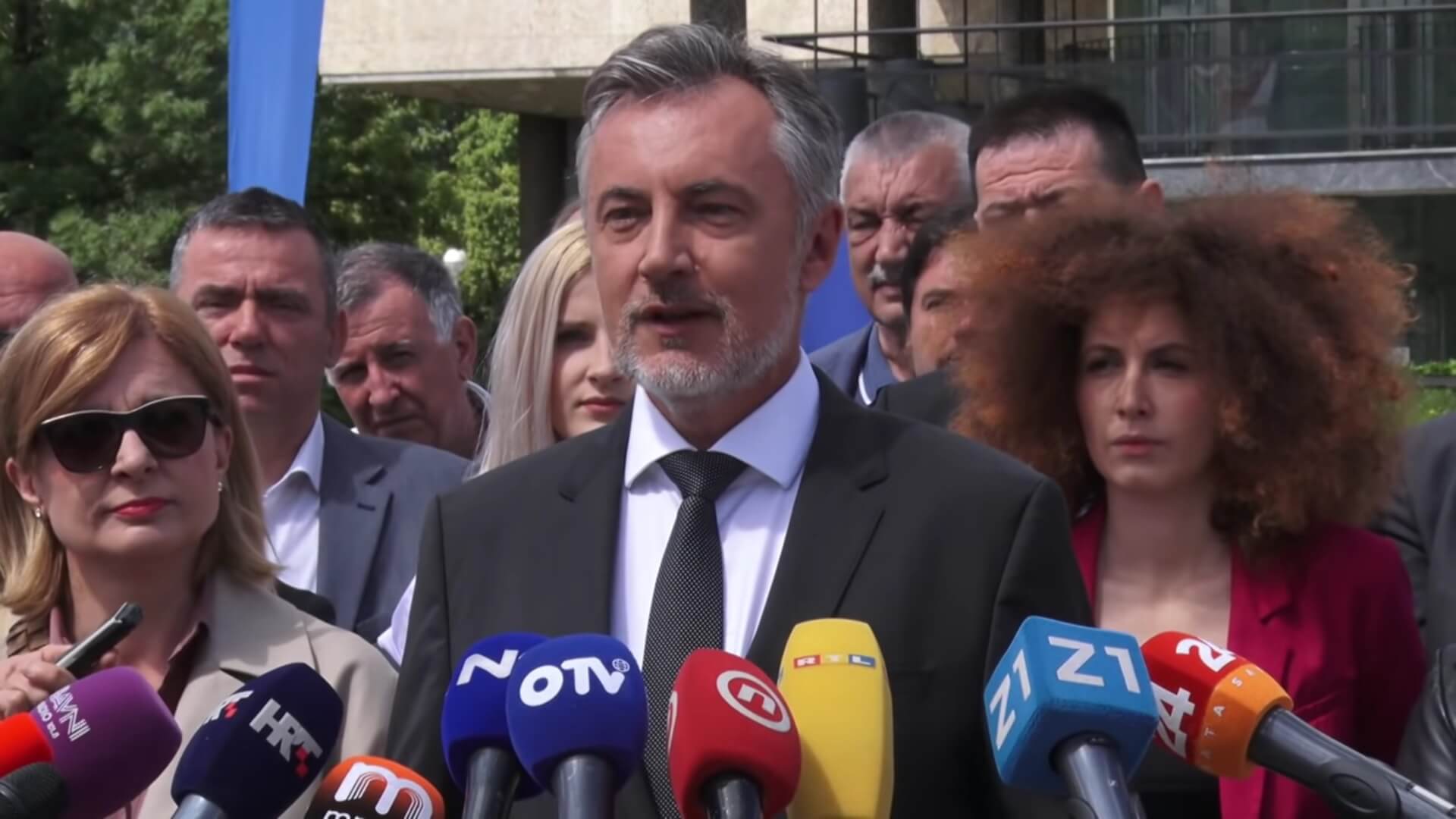
Miroslav Škoro, screenshot / Domovinski Pokret
This sort of rhetoric took everyone by surprise. Dražen Lalić, a sociologist and a professor at the Faculty of Political Sciences at the University of Zagreb, commented for RTL that Škoro himself is a radical candidate and that We Can! (Mozemo!) are neither extreme nor are they the radical left.
''Regardless of Škoro having a doctorate in economis, he's illiterate in the political sense; he doesn't know even the most basic terms. Extreme means outside of the system and not going to the elections. Radical actors are inside the system, and I think Škoro is radical. On the other hand, Tomašević and We Can! (Mozemo!) are very moderate in their attitudes; they're young people. There were no incidents and they are were moderate,'' said Lalić for RTL. He added that Škoro is probably aware that he had absolutely chance of winning but was still trying to reach the far-right electoral body.
24sata columnist Tomislav Klauški wrote about how Škoro's war with the perceived ''extreme left'' is quite literally the only thing in his entire programme. He concluded that such a move isn't going to work for Zagreb, which has never voted for far right options, and he also reminded that former mayor Milan Bandić, despite his many flaws, also came from the social-democratic political option.
''His filthy campaign from the first round, where his agency spread lies that Škare Ožbolt works ''for the Serbs'', where his news sites spread stories that Filipović's father is Serbian, and warned that Tomašević is a concealed right-winger, Škoro is now going further with that into the second wrong. As if Zagreb doesn't have enough problems to talk about,'' wrote Klauški on Monday after the first round.

Dražen Lalić, screenshot / N1
Škoro then continued to push the narrative of these elections, declaring them an ideological referendum among right-wing and conservative circles. Škoro also accused We Can! (Mozemo!) of being foreign mercenaries working for famous philanthropist George Soros or wanting to revitalise Yugoslavia, and Škoro's associate Zlatko Hasanbegović stepped out into the Croatian public space calling the party a lesbian syndicate - weird indeed. Additionally, Nikola Grmoja (Most) stated for N1 that Mozemo are iPhone Soroshians, and accusations accompanied by rather odd name-calling saw a random generator on the internet designed to mock these terms by random options. Meanwhile, Tomašević continued his campaign by talking about solutions to the problems Zagreb is currently facing but occasionally making remarks on the accusations by his opponents and sometimes even throwing some accusations in Škoro's direction in return.
67% : 33% K.O.
This focus on actual problems Zagreb is facing and the refusal to dwell into ideological issues, along with the experience of activism for Zagreb's interests, proved to be the winning formula for Tomašević, beating Škoro with amazing 199,630 votes compared to Škoro's 106.300 votes. Not only did Tomašević beat Škoro by far, he also earned more than former mayor Milan Bandić did, and nobody has had more votes in Zagreb's mayoral elections to date.
Škoro lost his own so-called ideological referendum, but let's imagine for a moment that he actually won. Whether Škoro (or some other analysts who believed these elections would finally prove how Zagreb looks at things with an ideological eye) likes it or not, this "referendum" neither proves that Zagreb has turned to some radical left nor does it prove the opposite. First of all, only 45.7% of people voted on the second round of these elections. That's not even half of the total number of citizens that have the right to vote in Zagreb. Secondly, the culture and overall vibe of Zagreb truly tells us that Zagreb is diverse and very much open for everybody.
Zagreb - The pioneer liberal city for every idea
One thing we can say for certain about Zagreb's philosophy, if you will, is that Zagreb is proud to be a pioneer of development and a role model for the rest of the country. To illustrate that, Zagreb was proud that they'd be the first to use telecom lines, and by the time the rest of Croatia got telephones, Zagreb already had mobile phones. Being the capital city of Croatia, and the biggest city in the country, a centre of politics, education, science, culture, and more, Zagreb attracts people from all over the country and abroad, having bloomed into a multi-cultural city whose people have various ideologies and convictions.
When you look at ideological conflict in Croatia, which sadly doesn't seem to be anywhere near its end, it is often perceived that if you're a Croatian nationalist and conservative in Istria, you'll feel quite lonely indeed. On the other hand, left leaning progressives and liberals living in Dalmatia or Slavonia, areas that are known to be quite conservative, can't wait for a chance to leave those areas.
That being said, apologetics of all ideologies head to Zagreb, and Zagreb is a place where looking straightly from an ideological view, everyone is equally happy and miserable at the same time, but overall they're in a better position than in the rest of Croatia is. Before the pandemic, you had a regular event called ''Coffee with non-believers'' hosted by various venues such as Spunk bar or No Sikiriki. The event allowed for all atheists, agnostics, or even religious people unhappy with the breach of secularity by the Catholic Church in Croatia – to find those who think like they do, meet in person, talk, and have a good time.
On the other hand, in the Veliki Tolk pub in Opatovina, you have ''Right-wingers in the Pub'' which provides the same comfort and good times for the conservative-oriented people.
Regardless of what kind of genre of music you listen to, what movies you want to see, what kind of clubs you want to go to, mainstream pop, alternative rock, electronics, jazz... Zagreb's public sphere offers something for everyone.
Zagreb does have hospitals whose doctors refuse to perform abortions, but if there is any place a woman can have her reproductive rights respected in Croatia, then that place is Zagreb. Despite several violent homophobic incidents, the relaxing atmosphere of the LGBTQ Pride picnic on Ribnjak Park, and the support coming for the parade from the windows of Zagreb's buildings show that Zagreb is a safe place, and you won't feel alone because of your sexual preferences.
How these ideologies co-exist in being equally happy and miserable at the same time was perfectly demonstrated over the last two weeks. LGBTQ flags put out for the International Day Against Transphobia were torn down by vandals on the Victims of Fascism Square. A few days later, a pro-life initiative, Hod za Život“ (Walk for life) flags displayed on Ban Jelačić Square, were also quite quickly torn down. And the culmination of that event was seen on Saturday when the pro-life Walk For Life march was met with counter-protesters from Crveni Otpor (Red Resistance), which is pro-choice. So, as we can see, these ideologies create conflict at times, but more often, it's a peaceful co-existence. Equally miserable and happy at the same time, and still in a better position than the rest of the country.
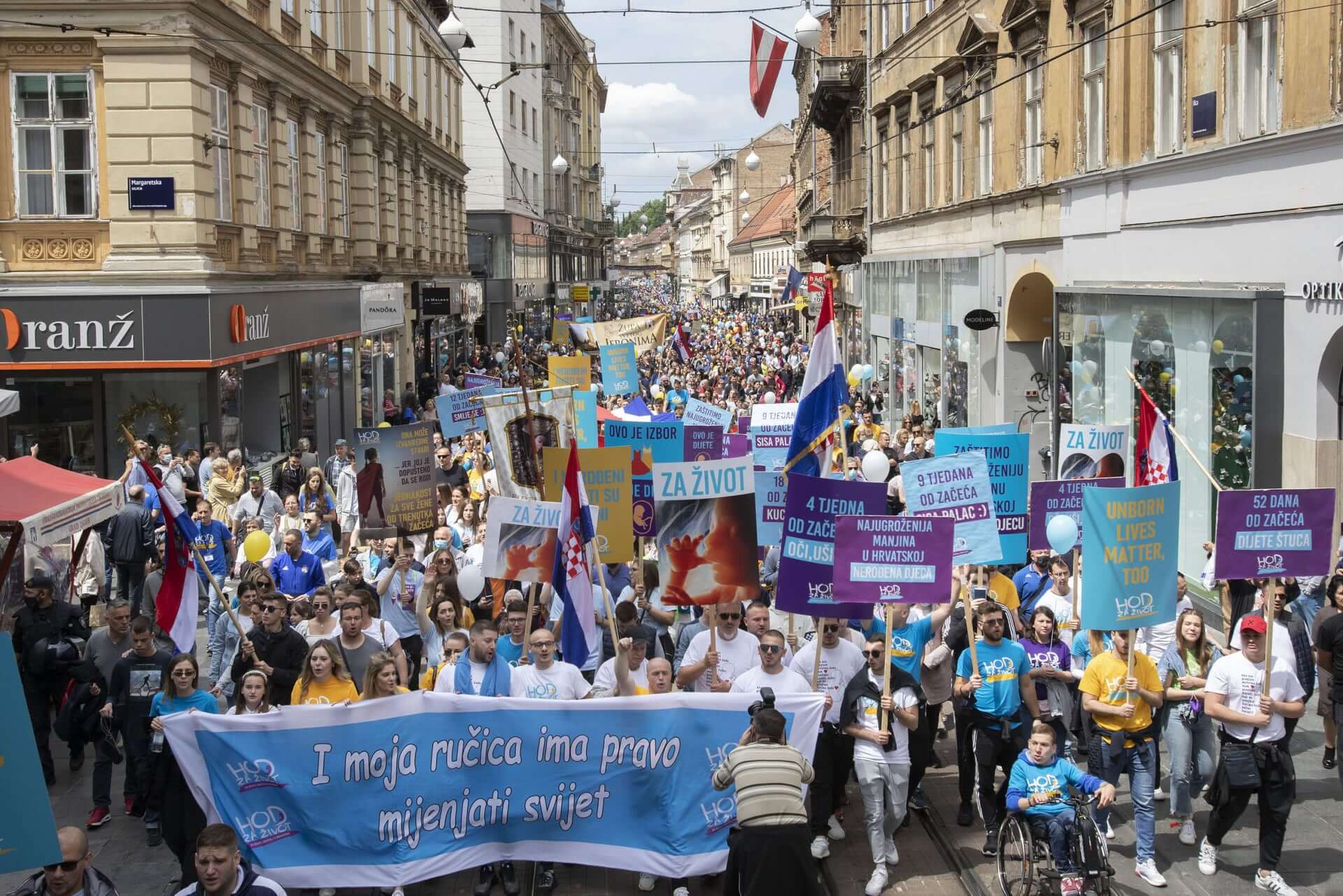
Pro-life march in Zagreb © Hod za život - Zagreb
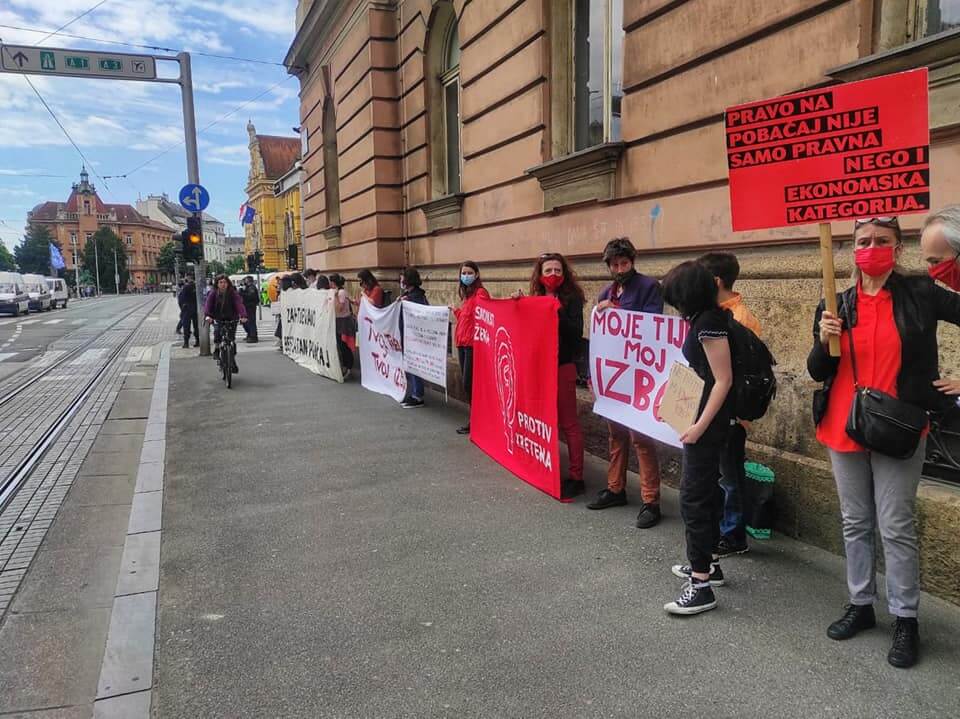
Pro-choice protesters waiting for pro-life march in Zagreb © Faktiv
Zagreb is liberal in its nature, courtesy of the growth and development it has seen, and even in the event that a conservative or even a radical conservative ever took the mayoral position, Zagreb wouldn't lose what it is in its soul.
Those who vote in Zagreb proved that ideological disputes are irrelevant, as long as freedom is respected by the candidate, and as long as you are not a radical and have a good solution for the city's problems, you're more than welcome to try and be a mayor.
Democracy is yet to be understood
That being said, there are some issues these elections highlighted for the political culture of Zagreb. First, Zagreb citizens that don't vote need to understand that voting is very important as our democratic right to have our say in what we want in Zagreb (as in the entire country). The freedom and all of the perks of living in Zagreb that citizens enjoy or don't enjoy are the direct results of politics, and any improvements or downfall in the city will come from politics. Having your say in these dynamic events is something that shouldn't be missed.
Democracy isn't a once-every-four-year event but a continuous practice of civic participation to make sure that promises before the election don't end up forgotten after the celebration.
Tomašević has said that "Zagreb is ours" (as is the name of one of the political parties in the Mozemo! platform), and so it's important for him to be open for the city's citizens, but also for citizens to be open to communicate with the local authorities to make a better community.
Learn more about Zagreb on our TC page.
For more about politics in Croatia, follow TCN's dedicated page.


